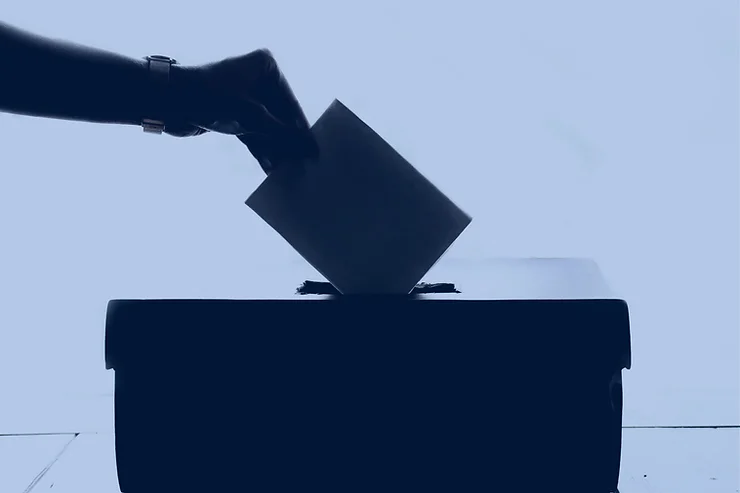
As campaign 2020 has taken a back seat to the coronavirus, Principal Larry Ceisler examines the logistics of a November vote, the effect of the pandemic on the national and local races and the impact of Sen. Bernie Sanders dropping out.
Q: How does the country run an election during a pandemic?
Larry Ceisler: America is an innovative place, so we will find a path for people to vote. It’s going to be a hybrid of how they have voted in the past. Certainly, there will be more vote-by-mail, probably combined with a longer voting period. The polls should stay open for several days. Maybe it becomes like the methods used for jury duty summonses – on a certain day, if your last name begins with the letter C, you can vote. Or if you’re over 60, this is your window.
Q: Are both sides going to believe in that kind of approach?
LC: The problem is, whoever loses will cry foul, say there was fraud and claim the results are not legitimate. And given that there’s no united way of running elections – it’s all decided state by state – we could have a new Gore vs. Bush, where it ends up in the Supreme Court.
Q: If we can’t have voting as usual, does it benefit either side?
LC: Trump will do better if turnout is smaller. A smaller turnout is always better for the incumbent. That’s the law of politics. So Republicans will try to hold down the total. It will be interesting to see how this plays out in Pennsylvania, where there’s a Republican legislature, but a Democratic governor and Democratic majority on the state supreme court.

Q: This election has always been seen as an overall referendum on the president. Is it now simply a referendum on his handling of the Covid-19 outbreak?
LC: If you watch the talk shows they say it’s all about that. I’m in the minority. My feeling is the vote is already baked in, so the only variable is turnout. Who gets their people out? The pandemic and how Trump has dealt with it doesn’t make a difference in terms of the base Trump voter or Democratic voter. They’re locked in. It’s all going to be about who shows up at the polls – or votes in whatever method is available.
Q: President Trump is on television every day now. How does Joe Biden gain attention?
LC: People want to see Biden out there, but I don’t think he really needs to do that. I’m not sure we even need debates this year. As I said, it’s already baked in. Re-elections are always a referendum on the president. So people either want to see Trump have four more years, or they don’t. As for Biden, he’s basically a vanilla alternative, the likeable guy. He does have an established record and contrasts well to Trump, so it’s not like he has to go out now and introduce himself to the people.
Q: What’s the impact of Bernie Sanders dropping out this week?
LC: It’s a positive for Biden, of course. The Bernie people are distraught right now, and it’s up to Bernie to rally his people to get out there this fall. Bernie may have lost the battle but in many ways, he has won the war. A lot of ideas Bernie has championed will see the light of day expedited by this pandemic. In some ways, he’s like Moses – who also didn’t set foot in the Promised Land.
Biden was really smart in that he always kept a good relationship with Bernie Sanders. It apparent that even though they disagree on many issues, they had a good a personal relationship. Bernie always called him, “my friend Joe.” That’s Biden’s strength – he can disagree with people, but not be disagreeable.

Q: Any thoughts on where Biden is going to look for a vice presidential partner? He has already committed to naming a woman.
LC: The job of a vice presidential candidate is simple: Carry your own state and don’t hurt the ticket. Nobody really votes for the vice president. It’s good if you find someone who gets people excited, but at end of day, people are voting for the person at the top.
Kamala Harris makes sense, even though Biden will win California anyway. I like Amy Klobuchar, who would help in Minnesota, but she may be too moderate. The rising star is Gretchen Whitmer, the governor of Michigan, a battleground state. I’m not familiar with her politics, but know that she endorsed Biden before that state’s primary back in early March.
Maybe it’s Sen. Tammy Duckworth of Illinois, a military vet who provides some diversity. The governor of New Mexico, Michelle Lujan Grisham, is a name that now comes up a lot.
Q: One more question – how does the pandemic affect local races?
LC: Well, it’s very difficult to fundraise now and you can’t campaign door to door. So that gives an edge to incumbents. If you can’t raise money it’s tough to communicate your message. You can do more with digital and social media than in the past, and we’ll see a lot of that, but right now I don’t think voters know who’s running for Congress or in local elections. So the advantages of incumbency are larger than ever.




